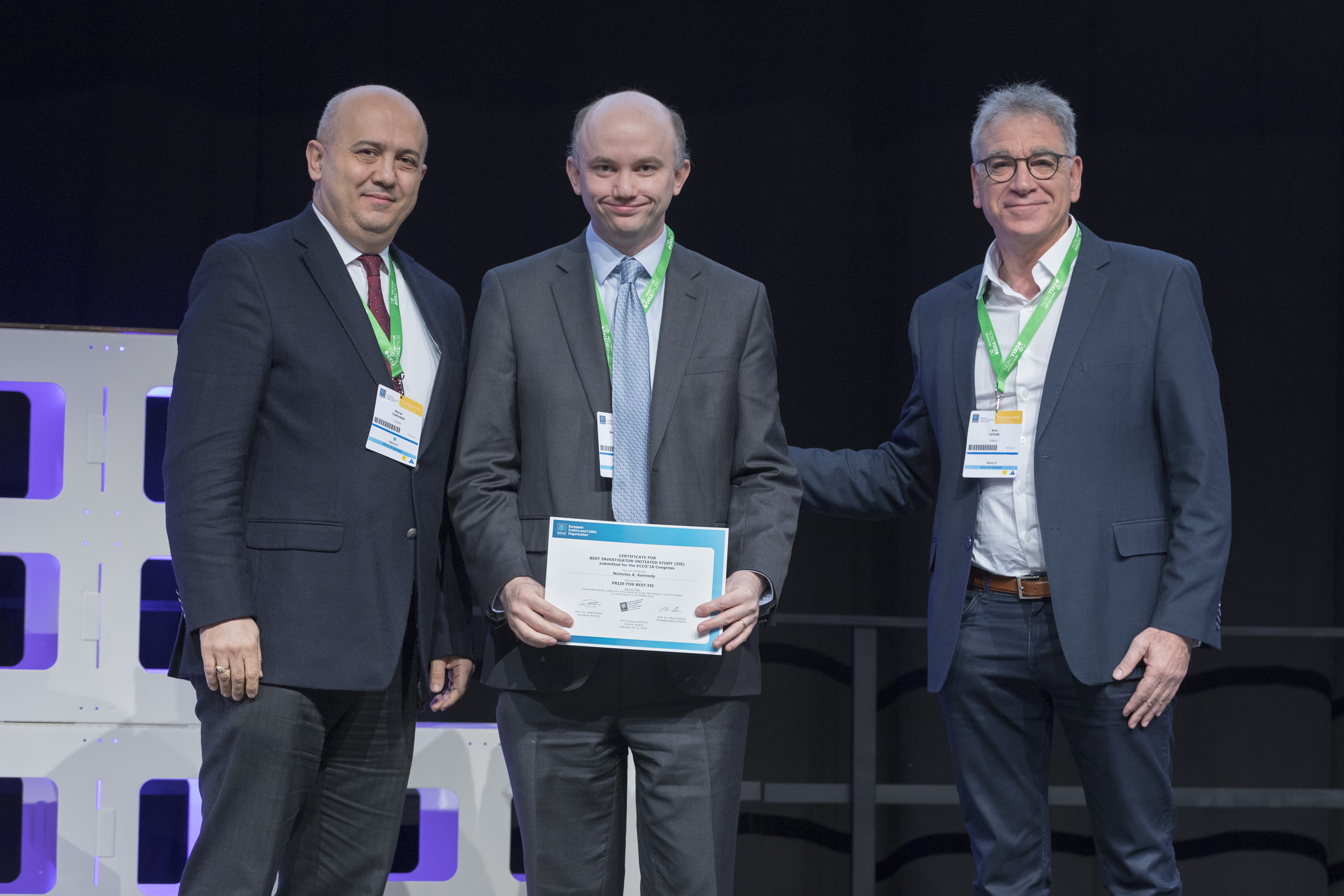ECCO'18 IIS Award Winner: Nicholas Kennedy
The PANTS study
 Nicholas Kennedy © ECCO |
Use of the anti-TNF alpha monoclonal antibodies infliximab and adalimumab has transformed the management of patients with refractory Crohn’s Disease. However, clinicians and patients are all too aware that anti-TNF treatment failure is common: 10%–40% of patients fail to respond to induction therapy (referred to as primary non-response: PNR), up to 40% of patients suffer secondary loss of response in the first year of therapy and approximately 10% suffer an adverse drug reaction that curtails treatment.
The PANTS study (Personalised ANti-TNF Therapy in Crohn’S Disease – NCT03088449) is a 3-year prospective observational UK-wide study investigating the mechanisms underpinning anti-TNF treatment failure. The study also aims to identify predictive biomarkers of treatment failure to allow safer, more cost-effective therapy, tailored to the individual patient. This study is led by the IBD Pharmacogenetics research group at the University of Exeter and supported by CORE, the British Society of Gastroenterology charity, and the UK National Institute for Health Research. Additional support has been provided by unrestricted educational grants from AbbVie, MSD, Celltrion, Pfizer and NAPP.
At the 13th Congress of ECCO, Nick Kennedy presented the week 54 clinical effectiveness and safety outcomes, and immunogenicity data to date. In addition, Alex Sazonovs presented the first downstream study using the PANTS cohort, investigating the genetic determinants of primary non-response and immunogenicity to anti-TNF therapy.
The PANTS study involved 1,601 patients from 118 UK sites who were treated with Remicade (infliximab, Janssen; 47%), biosimilar infliximab (CT-P13, Celltrion; 12%) or Humira (adalimumab, AbbVie; 41%). Inclusion criteria included age 6 years and over, no prior anti-TNF therapy and objective evidence of active disease supported by raised CRP (>3 mg/L) or calprotectin (≥50 µg/g). Baseline characteristics included: median disease duration 3 years (IQR 1–10); steroids 27%, azathioprine 44%, mercaptopurine 8%, methotrexate 5%; median CRP 9 mg/L (IQR 3–24) in infliximab-treated patients and 6 mg/L (IQR 2–14) in adalimumab-treated patients.
Primary non-response (PNR) was defined at weeks 12–14 as a requirement for ongoing steroids, or both failure of the Harvey-Bradshaw Index (HBI) to fall by ≥3 points or to ≤4 and failure of CRP to fall by ≥50% or to ≤3 mg/L. Using this composite endpoint, PNR was observed in 21%, 21% and 26% in the Remicade, CT-P13 and Humira treated patients respectively. Important baseline differences between the populations treated with infliximab and adalimumab were observed, limiting any comparison of end-points. PNR was associated with older age (p=0.0004), higher BMI (p=0.03) and low drug levels (p<0.0001). Remission defined at week 54 using a strict definition of HBI ≤3 points and CRP ≤3 mg/L and no concomitant steroids was 40%, 40% and 34% in the Remicade, CT-P13 and Humira treated patients respectively.
In the study immunogenicity was evaluated longitudinally using the IDKmonitor® drug tolerant assay. Immunogenicity rates were significantly higher for infliximab than for adalimumab, but were comparable between Remicade and CT-P13. At week 54, the immunogenicity rate for Remicade, CT-P13 and Humira was 26%, 28% and 11%, rising to 42%, 38% and 23% by 3 years respectively. The development of immunogenicity was strongly associated with non-remission at week 54 (p<0.0001) and for both drugs could be mitigated by the use of immunomodulators – IFX (HR=0.37, p<0.0001) and ADL (HR=0.34, p<0.0001). Drug withdrawal was necessary in 140 patients (9%) owing to serious adverse events, and five of these patients died, three from Crohn’s Disease and two from possibly drug-related acute respiratory illness.
In his separate presentation, Alex Sazonovs reported results from a study of genetic susceptibility to immunogenicity using genotype data on 1,284 patients from the PANTS cohort. Immunogenicity for both infliximab and adalimumab was associated with carriage of the HLA-DQA1*05 haplotype, independent of immunomodulator use. The clinical implications of this association need to be explored further but these data suggest that future strategies may allow targeted use of combination therapy for patients at high risk of immunogenicity. Further work needs to be carried out to explore genetic susceptibility to anti-TNF therapy in other ethnic groups and to other biologic drugs.
The PANTS repository of clinical data and biologic samples is currently being used in other multi-omic studies investigating anti-TNF treatment failure.
 Nicholas Kennedy at ECCO'18 © ECCO |
- Tags: ECCO Grant Study Synopsis, SciCom